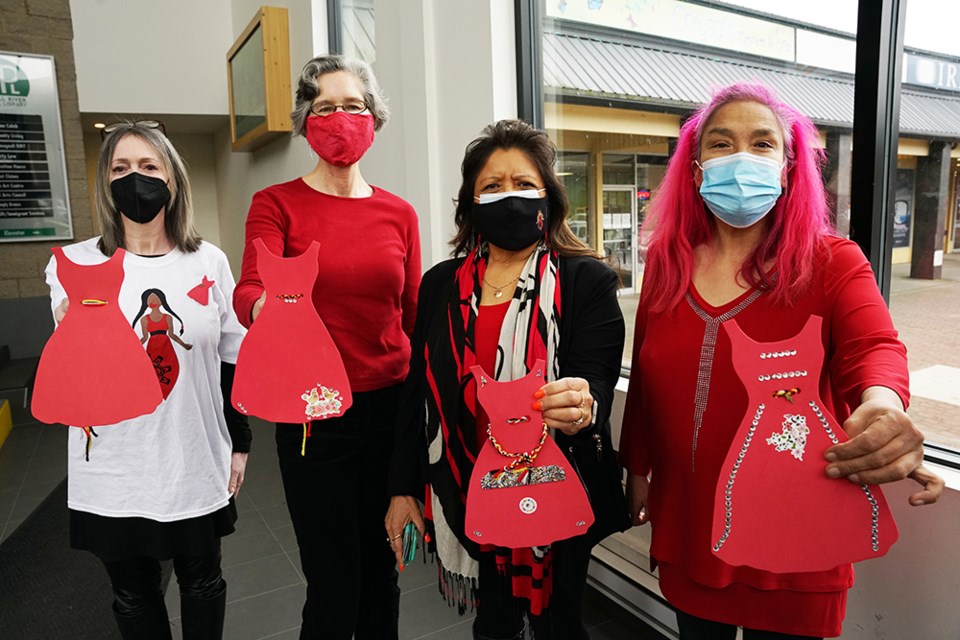A walk and candlelight vigil and ceremony in the qathet region in honour of murdered and missing Indigenous women has been scheduled for February 14, coinciding with a women’s memorial march in Vancouver on the same day.
According to Powell River and Region Transition House Society (THS) stopping the violence counsellor Cyndi Pallen, whose Tla’amin name is Chennay, the vigil has been organized by her, transition house executive director Ann Kurtz, Stopping the Violence outreach Annette Mennitti and the hɛhɛwšin organization.
“There are many reasons why this type of ceremony is needed in the community,” said Pallen. “One is to raise awareness of the many Indigenous women who have gone missing, and secondly, to raise awareness of the ongoing violence against women in general, who are victims of various types of abuse and violence.
“This walk/ceremony will also work to acknowledge the strengths and beauty of Indigenous women and women in general. The final reason, and most importantly, is to support in the healing of families who have been affected by the murdered and missing women.”
Pallen said this is the third gathering held by THS during the last three years.
As a citizen of Tla’amin Nation, Pallen has worked in various areas pertaining to health and human services and continues to advocate for women’s rights and families in general.
“This walk will be empowering for everyone and will also work to decolonize perceptions around Indigenous people’s experiences, who strive to overcome the many challenges and adversities faced in life,” said Pallen.
She said the organizers thank all of those who have supported initiatives through the years, including Tla’amin legislators, Powell River Recreation Complex, City of Powell River, THS, Powell River RCMP and hɛhɛwšin, which has recently expanded with a regular group meeting.
The murdered and missing Indigenous women walk and vigil will begin at 11:15 am from two locations and will proceed to Willingdon Beach, with distancing for COVID-19 in effect.
Walkers who live from Lund to Townsite will start from the old hospital site in Townsite on Arbutus Avenue. Participants from the rest of the region will walk from the sea walk parking lot in Westview. Walkers will proceed in pairs every five minutes, wearing masks. COVID-19 protocols will be followed so there will be no groups.
Participants are encouraged to wear a red t-shirt or something red in support of the event, as well as to bring a candle and cedar boughs. At 1:45 pm, the Willingdon Beach ceremony will begin, with Margaret Gisle (Nisga’a), of Powell River, serving as guest speaker.
To participate in the walk, prospective participants must register. They will be assigned an appointed time and will walk in alphabetical order, according to first names.
For people with first name letters A to D, text Cyndi at 604.223.6965. For first name letters E to I, text or call Caitlin at 604.928.0363. For first name letters J to O, text or call Jeremy at 1.306.715.7110. For first name letters P to Z, text or call Phil at 604.223.1280.
Film screening
At 3:30 pm, there will be a murdered and missing Indigenous women film at the Patricia Theatre. The venue will be at half capacity, with masks and vaccine passports required.
Pallen said hɛhɛwšin, which means moving forward, has been an active body and support system in raising awareness of colonialism. She said in the past year, another group has formed and partnered with hɛhɛwšin founders Phil Russell, John Louie of Tla’amin Nation, and Pallen, to support further initiatives, raising awareness in many areas pertaining to health and healing for Indigenous peoples, specifically supporting Tla’amin people.
Pallen said she began implementing three workshops that cover alcohol and the body system, grief, loss and trauma. She said this work has expanded through time as a result of her studies at University of Victoria and past training and education.
She said that as a service provider at THS, she recognized the challenges that are faced in every race and culture relating to grief, loss and complex trauma.




